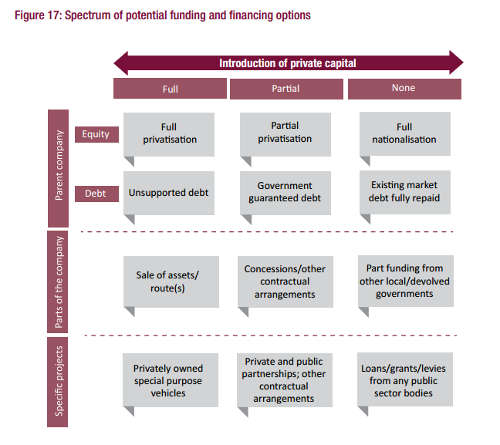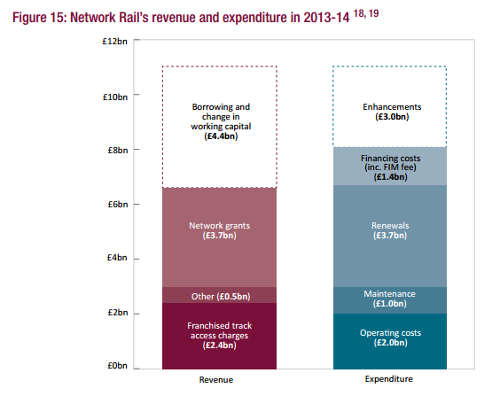There is ‘genuine consensus’ on the inherent problems with Network Rail according to a government-commissioned study that is considering both full privatisation and full nationalisation as a means to reform the public sector operator.
A scoping study for the Shaw report into the future shape and financing of Network Rail has confirmed it will look at ‘the broad spectrum of funding and financing options’ ranging from ‘full privatisation to full nationalisation (parent company level)'.
It will also investigate the issue of devolution and whether sub-national bodies could take on a greater governance and funding role.
The report states that it will focus on the best structure for Network Rail and recommend a funding and financing option to suit.

Table from scoping study
Nicola Shaw, the chief executive of the privately owned High Speed 1, is carrying out the review, which is due to report back early next year.
Whichever option is recommended the scoping study suggests it will need to tackle the problems the sector appears to agree on. These include:
- the way we do long term planning for rail could be improved in a variety of ways;
- the processes we have in a number of areas are frustrating and time consuming and could be considerably slicker and more effective; and
- there is a concern that, even if the rail industry is extremely efficient, the funds required for investment in rail infrastructure won’t be available in future because of the changes to Network Rail’s finances
Network Rail was effectively renationalised in August last year following a ruling by the EU, which brought the operator’s £37.8bn debt onto the public sector balance sheet.

Table from scoping study
Full privatisation seems an unlikely recommendation from the language of the report, which states government involvement stems from the fact that ‘public interest cannot be wholly met through the operation of a competitive market’.
‘The fundamental costs of delivering a national service are too large for competition in the market to bear, while the potential gains accrue across the wider economy,’ it adds.
However Labour’s shadow transport secretary, Lilian Greenwood, said the initial study ‘opens the door to the total privatisation of Britain’s railways… more fragmentation and more privatisation are the last things we need’.
‘We need a plan to improve the railways based around more integration and taking the franchises into public ownership, but these proposals would instead risk a repeat all the worst mistakes of the recent past. Labour will oppose them every step of the way and Ministers should urgently rule out the privatisation of Network Rail,’ she added.
Britain’s railways have previously undergone major reforms since privatisation in 1993 by John Major’s Conservative government, which led to the creation of infrastructure operator Railtrack, with trains operated as franchises.
This system soon fell apart following a series of fatal crashes, which exposed Railtrack’s inability to invest in the network to the necessary levels, and Network Rail was introduced.
A spokesman for pteg, which represents six metropolitan passenger transport executives, said: ‘We share and recognise the concerns that the report highlights around long-term planning processes that don't fit with wider city region and pan-regional transport planning, and the cost, bureaucracy and delay in getting the rail schemes implemented that our areas need as part of their wider growth plans.
‘In the next stage of the review we will be making a strong case for a much closer alignment between the way the railways operates and the way in which more transport decision making is being devolved.
'We can be an informed and committed sponsor for investment programmes in our areas and we can also accelerate rail investment and delivery by taking on the role of making schemes happen ourselves where there is appropriate scope to do so.'
The report is one of three currently taking place into Network Rail, after the operator suffered a torrid period of delivery failure.
Sir Peter Hendy – who was named as the new Chairman of Network Rail – is to report by autumn 2015 with a plan to get the rail investment programme back onto a sustainable footing; and
Dame Colette Bowe is looking at lessons learned from the planning process undertaken for CP5, to make recommendations for better investment planning in future, also reporting in the autumn.